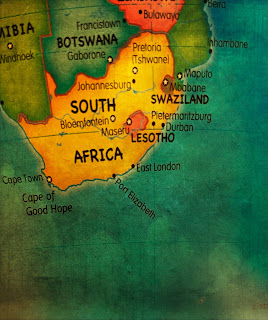READ
Most of the books I read for this project are relatively
contemporary, but that’s not always an option. For Lesotho, a country that is
surrounded on all sides by South Africa, the only book I was able to find was Chaka, written by
Thomas Mofolo and translated by Daniel P. Kunene. Chaka, which was
published in 1925, is a fictionalized account of the life of Shaka, who founded
the Zulu Empire and ruled from 1816 to 1828.
Chaka is conceived out of wedlock by Senzangakhona, King of Mazulu, and Nandi, a local beauty. They marry when they learn that Nandi is pregnant, but the fact that Nandi was pregnant before they got married would be a scandal, if word got out. Senzangakhona has three or four other wives, but none of them have produced a son, so Chaka and his mother are tolerated initially. However, when the other wives begin to bear sons, they threaten to expose the scandal surrounding Chaka’s birth unless Senzangakhona agrees to disinherit Chaka and expel him and Nandi from the royal home. Senzangakhona does as they ask.
As an outcast, Chaka endures a miserable childhood, getting attacked regularly by other children. That ends when his mother takes him to a medicine woman, who gives him potions that make him stronger and more aggressive than everyone else. When he begins to perform feats of strength and daring that none of the other men or boys in the village can do, the women all start to sing his praises. This upsets the men, of course, and they plot to kill him, so he flees the village. Disillusioned with how he is being made to pay for the sins of his parents, Chaka, who had been a pretty decent guy until that point, vows to be his own man and do whatever he wants to do from that point on.
After he leaves his village, he meets a healer, Isanusi, who gives him strengthening medicines to make him a great warrior and a great king. He leads him to the kingdom ruled by Dingiswayo, where Chaka’s talents are immediately put to use. Chaka’s new philosophy is: “I shall simply kill whomever I wish to kill, whether he is guilty or not, because that is the law of this world. I will never have mercy on a person simply because of his pleadings.” When Dingiswayo is killed in battle and Chaka becomes king, he continues to rule with that philosophy and kills people, both in his own kingdom and in others, at an alarming rate. He expands his territory by laying waste to village after village, burning the fields and killing most of the people except for the young men who are forced to join his army. In this way, he builds the great Zulu Empire until karma finally catches up with him.
As much as his childhood lays the groundwork for the man Chaka becomes, the medicine man, Isanusi, influences him greatly in the path he chooses to follow. Isanusi reminds him often that his power depends on continued bloodshed, and that he must sacrifice those he loves the most in order to be an even greater king than he can imagine. Greed, power, and bloodlust become the motivating factors in his life.
Chaka wasn’t a particularly enjoyable book to read, but it accomplished one of the purposes I had in mind when I started this blog – to help fill in some holes in my education and in my understanding of the world.
COOK
Chaka didn’t provide any help in figuring out a dish to cook for this post, so I went to the Internet. In an article about what to eat in Lesotho, I found a dessert called makoenva, which is basically deep-fried dough balls with raisins, rolled in cinnamon sugar. The International Cuisine website had a recipe that was vegan without needing any adjustments. The makoenva turned out really, really well. I mean, everyone likes fried dough with sugar, right?
GIVE
Reading about Chaka’s conquest of other kingdoms and the
wreckage that he left in his wake made it sound like a big part of his legacy
was creating an environmental wasteland. So when I looked at the two projects
in Lesotho that were listed on the GlobalGiving
website, I chose the one that looked like it would help the most people with the
least environmental impact. Onepower Lesotho is working to manufacture affordable
solar energy technology in rural areas of Lesotho to help power health clinics,
schools, and businesses. This project will also create good job opportunities
for people who might otherwise have to move to the cities to find work. More
information about this project is available at: Solar
Jobs & Energy - Village Minigrids in Lesotho - GlobalGiving.


